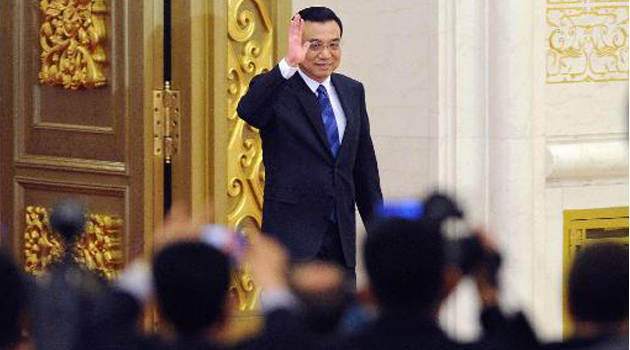His comments come after the country’s first-ever default on a domestic corporate bond last week and as investors grow worried that other firms could follow suit.
Li said authorities “pay very high attention” to financial and debt risks, as he held his once-a-year news conference after the close of the annual session of the National People’s Congress (NPC), the Communist Party-controlled legislature.
He could not possibly “want to see” defaults on financial products, he said at the Great Hall of the People.
“But I’m afraid sometimes certain individual cases of such defaults are hardly avoidable,” he added.
Shanghai-based Chaori Solar Energy Science & Technology Co. said Friday it was unable to make bond interest payments of 89.8 million yuan ($14.7 million), sending it into a landmark default.
And on Tuesday power equipment maker Baoding Tianwei Baobian Electric Co. said its bonds would be suspended from trading after it posted two consecutive years of losses.
However, analysts said the Chaori default could benefit the market in the long term by raising awareness of risk and making investors more selective.
“Allowing Chaori to default on its bond was in fact an obvious sign that the government has started to make some adjustments (in policy),” said Zhou Hao, Shanghai-based economist for ANZ Bank.
“Previously, it wanted to avoid defaults, but now it hopes to rely more on market-oriented measures to ease some risk,” he told AFP.
Ratings agency Moody’s said: “We believe the default will spur needed development in the onshore bond market.”
“The lack of intervention is consistent with the central Chinese government’s adoption of more market-oriented policies, which include increased tolerance for corporate bond defaults, as it reforms the country’s financial markets,” it said.
Early this year, worries surfaced in China over other financial products issued by trust companies, which have drawn comparisons to American “junk bonds” of the 1980s.
In one case, a $160 million investment product structured by Jilin Province Trust and backed by a coal firm failed to make capital and interest payments.
Separately, a $500 million investment product structured by China Credit Trust avoided default in January after an unknown party made good on principal payments to hundreds of investors, though they did not received pledged interest.
Such products are part of a murky “shadow banking” system — a vast network of lending outside formal channels and beyond the reach of regulators. They include activities by online finance platforms, credit guarantee companies and microcredit firms.
The “shadow banking” sector was as large as $4.8 trillion in 2012, more than half the country’s gross domestic product, according to a previous estimate by Moody’s.
Li said authorities have a grip on financial risks to the economy and played down worries over huge debts run up by local governments which have splurged on infrastructure and other investments.
Some local authorities, which have long used debt to fuel economic growth in their regions, have pursued projects that are economically unviable or unsustainable.
“What we should do is to step up monitoring, properly handle relevant measures and be sure that there will be no regional and systemic financial risks,” Li said.
In late December, China revealed in a long-awaited debt audit that liabilities carried by local governments had ballooned to 17.9 trillion yuan as of the end of June 2013.
The figure, released by the National Audit Office, compared with 10.7 trillion yuan at the end of 2010 — an increase of 67 percent.
“We have released to the public the results of this comprehensive audit as it is, and the result shows that the risks are on the whole under control,” Li said.


































